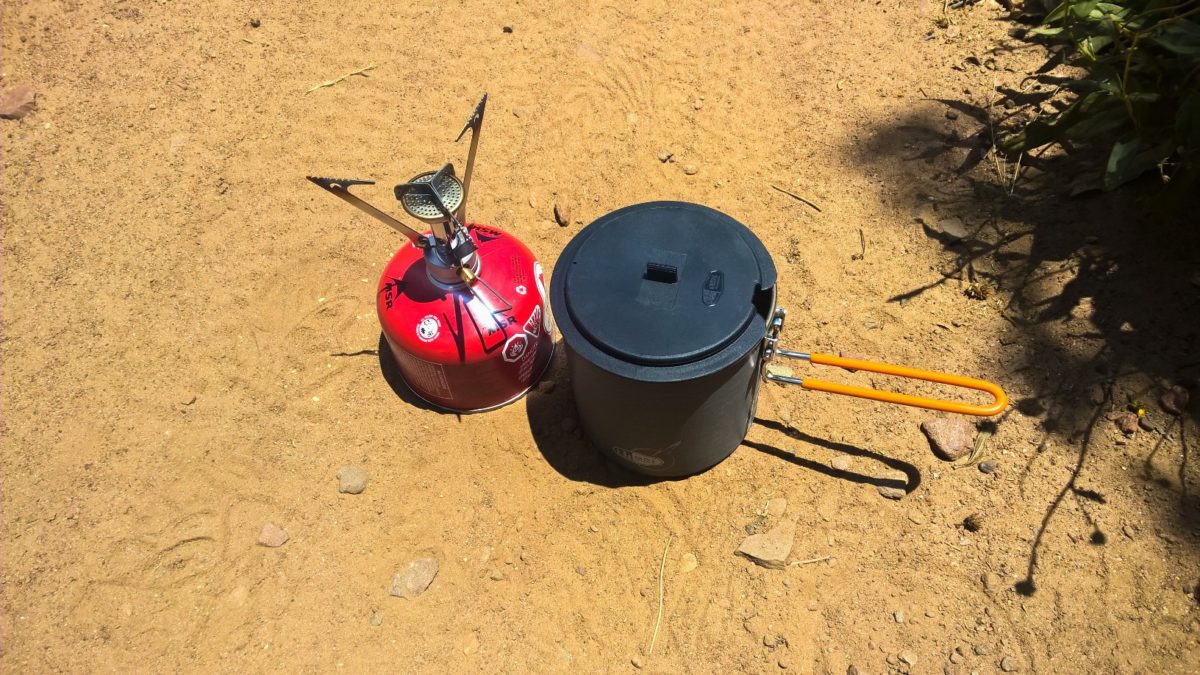
How to Choose a Backpacking Stove
Knowing how to choose a backpacking stove can be an incredibly important consideration. Imagine, you’re out on the trail, packed with some of the best dehydrated food your local outfitter has to offer and the stove that you’re carrying has stops working on you. To paraphrase the movie Wild “great – cold mush.”
Make sure that your stove is the right one for the right occasion. Taking considerations like fuel, seasonal weather and where you’ll be backpacking are all important considerations that tend to go overlooked by some experienced backpackers, not to mention beginners. Of course the main considerations of weight and boil time are typically carefully studied before making the first purchase. Here’s a guide to help you decide what kind of stove you should be buying.
Integrated Backpacking Stove Systems
Integrated stove systems like the ones by Jetboil and MSR are great all in one style systems that pair the stove with a pot that’s designed specifically to work with that stove making these stove systems great for boiling water. They’re also fuel efficient, wind resistant and compact. The challenge to them is that they don’t work quite as well in extremely low temperatures because the isobutane-propane fuel canisters need to be kept above freezing and most of them require an adapter to use other pots, potentially rendering that cook set you bought useless.
|
Stove |
Fuel |
Weight |
Avg Boil Time |
|
 |
Jetboil Flash Cooking System |
Isobutane-propane |
15.25 oz |
5 min |
 |
JetBoil FlashJava Kit |
Isobutane-propane |
1 lb 0.25 oz |
5 min |
 |
Jetboil Joule Cooking System |
Isobutane-propane |
1 lb 9.2 oz |
2 min 40 sec |
 |
Jetboil MiniMo Cooking System |
Isobutane-propane |
14.6 oz |
4 min 30 sec |
 |
Jetboil Zip Cooking System |
Isobutane-propane |
11.75 oz |
5 min |
 |
MSR Reactor Stove System |
Isobutane-propane |
1 lb 3 oz |
3 min |
 |
MSR WindBoiler Stove System |
Isobutane-propane |
15.25 oz |
4.5 min |
Canister Fuel Backpacking Stoves
Canister stoves are the most convenient for trail experiences that don’t get too cold. They attach to isobutene-propane blend fuel canisters and are easy to use without any priming. Canisters self-seal to prevent fuel spills and are easily adjustable for varied cooking temperatures. Fuel canisters do need to be kept above freezing to operate efficiently so, as long as you’re not in sub freezing conditions, these types of stoves should work well for you.
|
Stove |
Fuel |
Weight |
Avg Boil Time |
|
 |
MSR MicroRocket Stove |
Isobutane-propane |
2.6 oz |
3 min 30 sec |
 |
MSR PocketRocket Stove |
Isobutane-propane |
3 oz |
3 min 30 sec |
 |
Primus Classic Trail Stove |
Isobutane-propane |
8 oz |
3 min |
 |
Primus Eta Stove |
Isobutane-propane |
1 lb 5.1 oz |
3 min 35 sec |
 |
Snow Peak BiPod Stove |
Isobutane-propane |
7.76 oz |
4.5 min |
 |
Snow Peak GigaPower Auto Stove |
Isobutane-propane |
3.75 oz |
4 min 48 sec |
 |
Snow Peak LiteMax Stove |
Isobutane-propane |
1.9 oz |
4 min 25 sec |
Liquid Fuel Backpacking Stoves
Liquid fueled stoves are best for cold weather, international trips and longer term trips. The great thing about liquid fuel stoves are that, while they all run on white gas, some of them can also run on kerosene, jet fuel, diesel or plan old unleaded automotive gasoline so, no matter where you are in the world, you should always be able to find fuel. Fuel for these stoves is relatively inexpensive but most do require priming the stove to preheat the fuel line before you start cooking. These stoves are also perfect for longer trips because they can be maintained, and even repaired, in the field.
|
Stove |
Fuel |
Weight |
Avg Boil Time |
|
 |
MSR DragonFly Stove |
White gas / kerosene / diesel / auto |
14oz |
White gas: 3 min 30 sec Kerosene: 3 min 54 sec |
 |
MSR WhisperLite International Stove |
White gas / kerosene / auto |
10.9 oz |
White gas: 3 min 30 sec Kerosene: 4 min 24 sec |
 |
MSR WhisperLite Universal Stove |
White gas / Isobutane-propane / kerosene / auto |
13.2 oz |
White gas: 3 min 30 sec Kerosene: 3 min 45 sec |
 |
MSR XGK EX Stove |
White gas / kerosene / diesel / auto |
13.7 oz |
White gas: 3 min 30 sec Kerosene: 2 min 48 sec |
Alternative Fuel Backpacking Stoves
These stoves are great for ultralight backpacking because the stoves themselves are incredibly light and use fuel sources that are also lightweight or found on the trail. Some of these stoves can even generate the electricity you need to keep your electronics charged on the trail (21st century backpacking at its best) The downside to these stoves is that these fuel sources don’t burn as hot as other fuels so it’ll take longer to boil your water when you’re ready to cook.
|
Stove |
Fuel |
Weight |
Avg Boil Time |
|
 |
BioLite CampStove |
Wood |
2 lbs 1 oz |
4 min 30 sec |
 |
Esbit Pocket Stove |
Esbit fuel tablets |
3.25 oz |
Unknown |
 |
Esbit Solid Fuel Stove & Cookset |
Esbit fuel tablets |
7 oz |
Unknown |
 |
Hexagon Titanium Wood Stove |
Wood |
4.1 oz |
Unknown |













